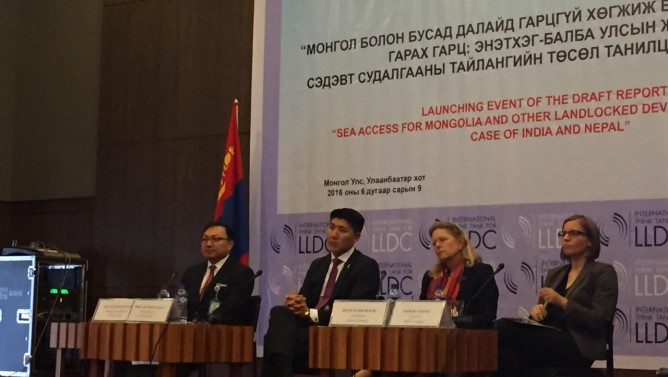Conference hall, 3rd floor, UN House
Ulaanbaatar, Mongolia, 4PM, June 9, 2016
The International Think Tank for Landlocked Developing Countries (ITT for LLDCs) organized the launching event of the draft report on “Sea Access for Mongolia and other Landlocked Developing Countries: Case of India and Nepal” in association with the Austrian Embassy in Ulaanbaatar on June 9, 2016.
Participants were:
- Representatives of line Ministries, such as a Ministry of Foreign Affairs, Finance, Industry, Agriculture, Road and Transportation, Energy, Mining,
- The Diplomatic corps,
- International organizations
- Private sector will be represented by the National Chamber of Commerce and Industry Independent researchers and experts
- Representatives of civil society etc.
The launching event was opened by H.E. Dr. Irene Giner-Reichl, Ambassador of Austria to Mongolia and Mr. Odbayar Erdenetsogt, Interim Director of the ITT.
The report was prepared by the ITT for LLDCs within the framework of a joint research project implemented in 2015-2016 with the kind financial support of the Austrian Government.
This launching event aimed at promoting the activities of the ITT for LLDCs in general and the introduction of the Draft report on “Sea access for Mongolia and other Landlocked developing countries: Case of India and Nepal” for the Mongolian stakeholders and Diplomatic corps in Ulaanbaatar for their review.
In order to expand their trade, LLDCs need to diversify their export and import destinations. For this group of countries, transit agreements with their neighboring countries are vital. However, in most cases articles of transit agreements are not favorable enough for LLDCs. Therefore it is vital to analyse transit agreements of LLDCs and provide these countries with evidence-based advice on how to improve opportunities to get connected to the major market poles.
The research produced an analytical paper assessing the trade relations between Nepal and India as well as the trade between Mongolia and its neighbors by using comparative analysis methods specifically focusing on the fact that Nepal is using Indian ports to access the sea.
It produced analysis on whether the India-Nepal example can be seen as a best practice for Mongolia and other LLDCs based on the Nepalese experience.
The study analysed realities on the ground and focused on bilateral transit trade agreements between the countries concerned and put an emphasis on practices that can be taken by Mongolia and other LLDCs as a best practice.
International Think Tank for LLDCs



